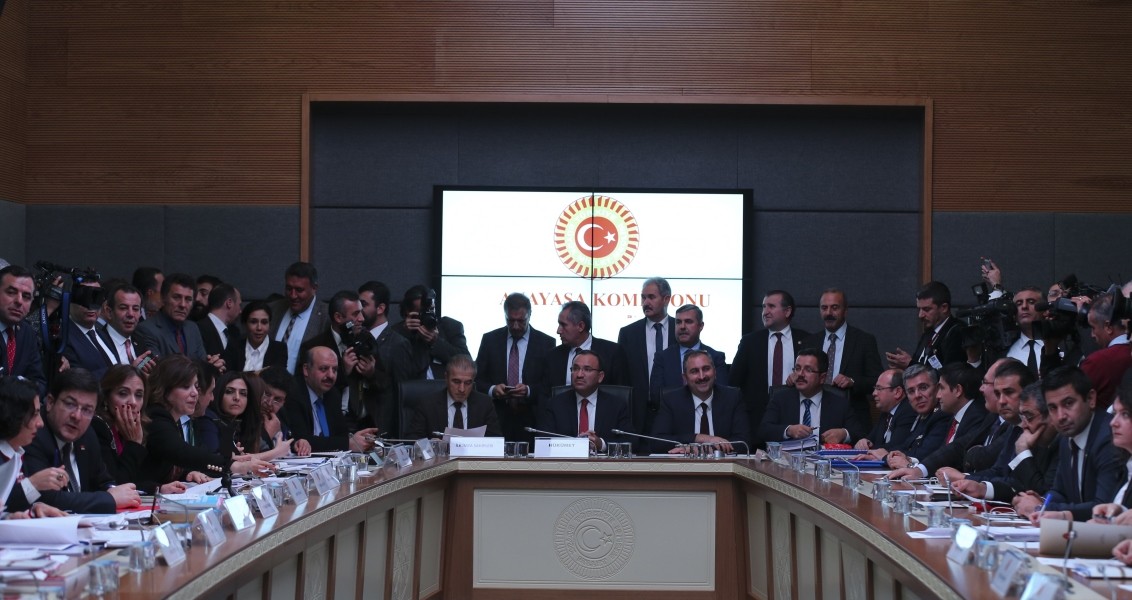
Turkey's New Administrative Model Is More Democratic
Simply put, the new constitution will pave the way for a more democratic atmosphere in Turkey by providing the clear seperation of powers
Share
As Turkey faces the challenges of terrorism and financial attacks on one hand, it is also engaged in enacting an extensive administrative system change on the other. At present, the constitutional change package that has been presented jointly by the Justice and Development Party (AK Party) and Nationalist Movement Party (MHP) is being approved article by article in Turkish Parliament. Despite the weak opposition being led by the Republican People's Party (CHP) and the Peoples' Democratic Party (HDP), all of the approved articles have surpassed the minimum 330 votes required for a referendum in the first round. It is highly likely that the second round of voting will begin next week and the decision for a referendum will come through. This means that Turkey will most likely engage in a referendum in April.
Unfortunately, the Turkish public thinks that until the month of April, "outside forces" will attempt to create an environment of chaos through terror and financial attacks. Yes, nearly 80 percent of Turkey's public is of this opinion. Our Western friends, despite complaining about "anti-Western sentiment" in Turkey, are not taking any concrete steps to lower the dose of this opposition.
At this point, the main priority for the liberal Western intelligentsia is to "overthrow Erdoğan." In this framework, they think that it is necessary to obstruct a yes result from the April referendum and Turkey's transition to a "presidential system." Because if Turkey transitions to a presidential system in April, it is a near certainty that Recep Tayyip Erdoğan will be the first president; they believe that they will not be able to prevent him from leading the country in a strong manner.
However, in the end, this decision is one that belongs to Turkey's citizens and this is exactly what democracy is about. It is right at this point that the emphasis that "democracy is not just the ballot box" it comes in and that the separation between the legislative, executive and judiciary being an indispensable part of democracy is brought up.
Unfortunately, this counter-argument does not take into account the balance-oversight mechanisms already present within the system and puts it forward as a simple element of propaganda. Within the constitutional change package, the legislative branch takes on a much stronger state than the one of today and checks the executive branch through various ways. The legislative branch will be able to check the executive in three ways. The first will be through the laws it enacts. The second is through determining the budget of the executive branch. And the third is through assembly research and investigations.
Another counter-argument that is brought up is that the president's authority to enact executive orders will mean a position above the law. However, in all presidential systems, the president's capacity for executive order is a common situation connected to the rapid operation of the system. This is not something specific to Turkey or to Erdoğan. When considering the nature of the executive orders to be brought up, they will be focused on the areas of execution, legislation and appointment-elevation. Above all else, it should be kept in mind that these executive orders are subject to the oversight of the judiciary and can be made invalid by a counter-law that is brought up by the legislative branch.
Another objection that is brought up is that with the new system, the presidential and parliamentary elections will be held on the same day. At the bottom of this objection lies the assumption that in the case of elections being held on the same day, the president's party will inevitably get the majority in Parliament. It is necessary to counter this with two justifications. First, regarding the people as being incapable of deciding what is good for themselves and thinking that they will be unable to tell the difference between the executive and the legislative is wrong. Second, in times when local elections and general elections occurred on the same day in Turkey, there have been examples when the results of the general and local elections differed greatly.
One other element that generally goes missing when debating Turkey's search for a new administrative system is the following. Within the current constitutional construct, the president is the strongest actor. Despite being endowed with many strong authorities, the president has neither political, nor judicial, nor penal responsibilities. In the new system, the president will have these responsibilities.
It is necessary that this be known first and foremost. Turkey's citizenry is one of high political rationality and consciousness and which feels a strong sense of belonging to its country. It is not possible for this citizenry to be shaped by political engineering or to be duped by a single person.
[Daily Sabah, January 13, 2017]
Tags »
Related Articles







